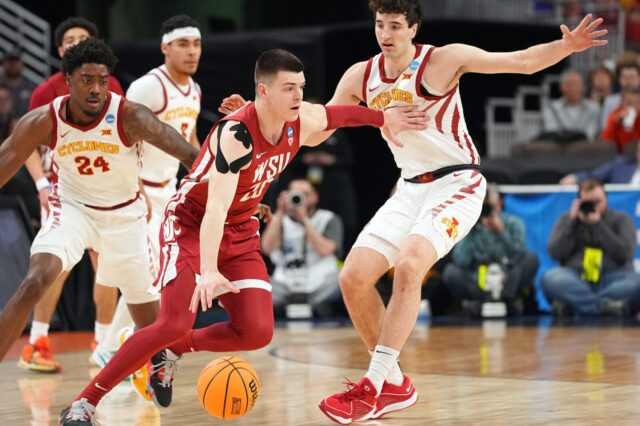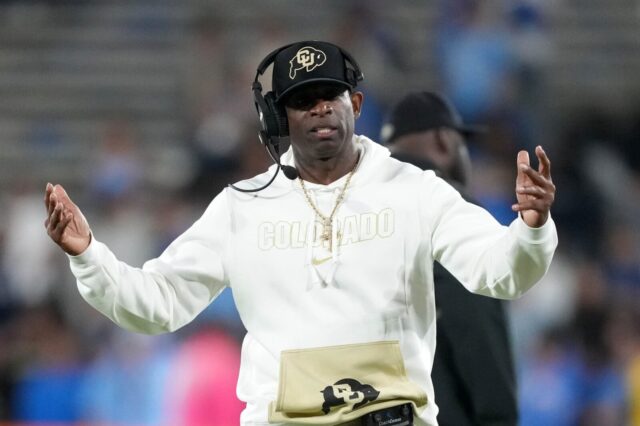Strike 3: There are four NCAA Division I men’s basketball programs in the state of Colorado. Between them, they’ve captured exactly TWO regular season men’s basketball conference championships during this century. Two. In almost a quarter century.
One was achieved by a 2011 UNC Bears team constructed by current Colorado Buffaloes head coach Tad Boyle, who left for Boulder following the 2010 season but whose players – led by B.J. Hill – were still the class of the Big Sky Conference that season. More importantly, they also went on to win the Big Sky tournament that season. With UNC alum Dick Monfort hollering at the refs from his seats at Butler-Hancock Arena (and who says the man is not all about winning?) the Bears knocked off Montana 85-80 to earn their (so far) only trip to the Big Dance, where they fell to San Diego State led by Kawhi Leonard. (Note, years later, UNC was forced to vacate those titles due to the use of an ineligible player.)
The other regular season title was captured by the school you’d consider the least likely to have hoops success – the Air Force Falcons. Two decades ago in 2004, current AFA head coach Joe Scott led the Falcons to the Mountain West regular season title before CSU knocked them out of the postseason tourney. AFA lost to North Carolina in the first round of the NCAA’s.
Colorado and Colorado State have each won one conference tournament title during that time span, but never a regular season crown.
Nobody around here is getting a regular season title this season, either. But all four get a fresh start when conference tourney play begins in just over a week. The Buffs, Rams, Falcons and Bears all have aspirations of participating in March Madness, provided a lot of really good things happen in the upcoming conference tourneys.
It’s still a little bit odd that the NCAA puts more value on winning a postseason conference tournament than they do winning the regular season version. But it does give teams who maybe have battled injuries, like the Buffs, or been grinding their way through a conference gauntlet like the Rams, a mulligan of sorts.
They each have some distant history as underdogs to look back at. The Buffs won the Pac-12 tournament in their first season in the league, back in 2012. That sixth-seeded Buffs squad remains the lowest seeded team ever to win the Pac-12 tournament. Boyle’s team had to win four games – against No. 2, No. 3 and No. 4 seeds in order to secure that NCAA tournament bid. CU then beat UNLV in the first round before being ousted by Baylor in the round of 32.
Just like the Buffs, the 2003 CSU Rams remain the lowest seeded Mountain West team to ever win their conference tournament. Those same sixth-seeded Rams also beat No. 2, No. 3 and No. 4 to turn a nice 19-14 season into a date with Duke in the first round of the NCAA’s. CSU put up a good fight, but fell to the Blue Devils in Salt Lake City.
Could history repeat for the Buffs – who will likely be a top four seed this season, and/or the Rams, who will likely be a co-No. 6 seed with New Mexico this year – as they try to recreate past glory?
And how important might a successful conference tournament run turn out to be?
Winning the conference tournament is not the be-all-end-all for CU and CSU, both of whom have a good chance of being in the field of 68 even if they don’t win their respective tournaments. A recent slide that saw them lose three close games hasn’t crippled CSU. The Rams – on the strength of a great non-conference resume – are still projected to be a No. 7 seed by the bracket guessing experts.
The Buffs are in a more precarious position, currently existing as the very definition of a “bubble team.” They need a good showing in the final Pac-12 tournament to secure an at-large bid.
On the flip side, a very bad showing – like losing as a favorite in an early round – could burst the bubble for both teams.





